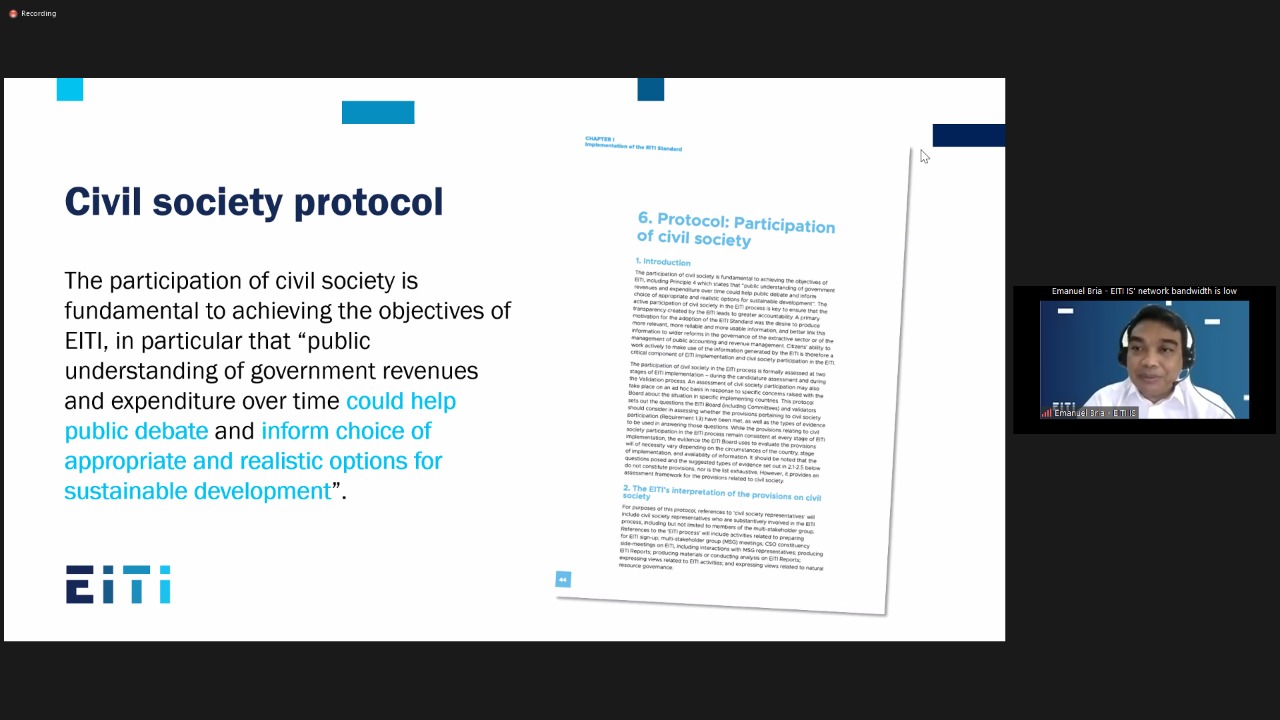Jakarta – The Extractive Industry Transparency Initiative (EITI) is a global platform to promote transparency in the extractive industry sector. The EITI is not a positive law, however, EITI could signal investors to assess the extent to which good extractive sector governance is carried out in a country. Several global development institutions make EITI reports an analytical consideration in providing international financial support, which Emanuel Bria has elaborated as Country Officer for Asia, EITI International Secretariat, in the PWYP Knowledge Forum (PKF) entitled EITI Standard and Its Development, which was held online on January 25, 2023.
PWYP Knowledge Forum (PKF) is a discussion and knowledge-sharing forum regularly organized by the Publish What You Pay (PWYP) Indonesia coalition. The event’s purpose is to increase understanding and capacity, as well as develop public discourse related to issues, topics, and policies in the natural resource sector.
The EITI Standard is a framework and process guide to promoting transparency and accountability in the extractive sector. The EITI Standard continues to be refined and developed. For instance, the latest EITI Standard 2019 contains several breakthroughs, such as the requirement to disclose license and contract documents and provisions on environmental, social, and gender impacts.
The EITI Standard requires the Government and companies to provide data and information comparing payments made by corporations in the extractive sector with state revenues received. The results of this process will be made into a report published to the public. In addition, the EITI Standard also requires the Government to publish data and information related to the extractive sector, such as legal and fiscal framework reforms, contract disclosure, tax revenue and non-tax state revenue (PNBP), disclosure of beneficial ownership (BO), environmental, social and gender impacts, and the context of the energy transition. Thus, EITI is expected to bring benefits such as minimizing corruption risks, strengthening tax and non-tax revenue collection, ensuring equitable sharing of Revenue Sharing Funds (DBH) for regions and communities, and providing space for more open public dialogue.
EITI promotes a multi-stakeholder platform approach where governments, civil society, companies, and investors engage in consultations and constituencies. At the Global level, for example, many civil society organizations support the EITI platform, including PWYP Global, Natural Resource Government Institute (NRGI), Transparency International (TI), Oxfam International, and more than 800 CSOs globally. In its implementation, EITI adopts the Civil Society Protocol, where the performance of EITI must protect the civil society, including existing communities, women, and other vulnerable groups, in voicing citizen rights issues in the extractive sector, despite the different conditions and political climate in a country.
The EITI Standard continues to evolve every year. At the beginning of the establishment of EITI, the applicable standards were the 2003 EITI Principle in the form of an agreement to increase the transparency of payments and state revenues in the extractive sector. The 2013 EITI Standard, which establishes rules and norms for compliance and reporting; the 2016 EITI Standard includes disclosure of project reporting and BO information; and the current 2019 EITI Standard, provides for contract disclosure, commodity trading transparency, transparency of state equity participation, environmental and social and gender.
In 2023, the EITI Standard will be strengthened, leading to energy transition and environmental impact. One of them considers the high demand for critical minerals for nickel and cobalt, which can harm mining communities. In the aspect of license allocation, the EITI Standard is also planned to contain provisions regarding Free, Prior, and Informed, Consent (FPIC). In the part of revenue flow, tax credit, which is a form of incentive for companies that contribute to development, is also being planned to be included in the future EITI standard.
Bria conveyed some key issues to continue to be strengthened in terms of implementing the EITI Standard. First, related to disclosing data on the valid beneficial owner or Beneficial Ownership (BO) is expected to prevent corruption and conflict of interest. Second, disclosure of oil and gas contracts and mineral and coal mining. Third, transparency of state revenue distribution from the extractive sector to the regions. Fourth, building systemic disclosure. The Fifth revolves around a topic related to gender. (EN/AN)

